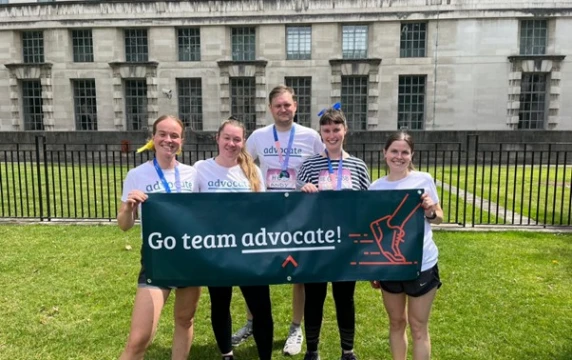Retired lawyers report that doing pro bono work or non-legal volunteering in retirement is a very rewarding way to spend their time and give back to their communities, while utilising their extensive legal skills. The National Pro Bono Centre with Advocate and LawWorks has put together practical information explaining how to do pro bono work in retirement, as well as ways to give your time.
Many lawyers were first drawn to becoming a lawyer as it gives the opportunity to change people’s lives and to uphold justice. Coming to the end of a busy career in the law is the perfect moment to think about opportunities open to you in retirement. With more time on your hands, and with an incredible skillset and lifelong legal training, you can have a life-changing impact on people’s lives giving just an hour or less a week. Pro bono legal help can make a difference across a huge spectrum of needs: from helping someone to understand a form or letter, to more in-depth casework and court representation.
Giving your time and skills to provide pro bono advice in retirement can be of enormous value to those requiring assistance, as well as an equally rewarding use of your time. With a wide variety of types of pro bono and volunteering opportunities available, you can ensure you find a commitment that suits your capacity and interests best.
What is Pro Bono?
Pro bono work is legal advice, drafting or representation provided free of charge by legal professionals in the public interest, undertaken voluntarily and provided to individuals, charities or community groups who cannot afford to pay for legal help and cannot get legal aid or other means of funding. The pro bono protocol is used as a way to define and support high pro bono standards. It is designed to make sure everyone is clear about what pro bono is and the standard to which it should be done.
Access to justice for all is an important principle within our society. We believe that all citizens should be able to seek redress and resolution through the justice system. We know that the reality for many members of society is that they cannot afford to access the justice system even if they are aware of their rights and responsibilities under the law.
Whilst the legal profession campaigns for enhancements to the publicly funded legal aid system, there is significant unmet need. There are a multitude of charitable and community organisations who work to help people, that rely upon the generosity of legal professionals' voluntary time to provide crucial services and support. No matter your legal background, there will be an organisation that would greatly appreciate your help and expertise. Your time will be deeply valued and as you’ll see by the quotes below, legal retirees who currently undertake pro bono find it to be a highly gratifying and rewarding experience.
We hope to encourage you to take a wider view of the possible pro bono opportunities in advance of retirement and provide you a space to consider options open to you.
“Prior to retirement I was thinking of teaching English as a second language through a refugee organisation on a voluntary basis, but my daughter persuaded me that many people can do that and it would be more effective to use my legal skills and knowledge, which are in shorter supply…the need [for pro bono] is enormous.” – Vivienne Gay, retired barrister who volunteers at several pro bono clinics as well as mentors young lawyers
“I do pro bono because I find it enjoyable and meet a whole range of interesting people, advisers and clients, as well as maintaining links with my old chambers.” – Andrew Hillier KC, retired barrister, chair of the Employment Legal Advice Network and volunteer at South West London Law Clinic
Where and how to get involved
- Advocate: Give free legal advice and representation as a panel member. Become an Advocate reviewer (you will not need a PC and will be covered by the Advocate insurance).
- LawWorks: Volunteer at one of the clinics on the LawWorks Clinics Network. With around 300 free legal clinics across England and Wales, there are opportunities for solicitors across the country. Alternatively, you can volunteer online through their digital platform, Free Legal Answers.
- Law Centres Network: Get involved with their Pro Bono Clinics.
Alternatively, you can also:
- Approach a locally-based advice centre.
- Approach a local university law clinic, or contact the umbrella charity the Clinical Legal Education Organisation (CLEO) to find a suitable law school clinic opportunity (either locally or further afield, providing remote supervision). Email: info@cleo-uk.org for more information. (Note: university clinics are likely to be able to cover the insurance for retired lawyers providing supervision, and in the vast majority of cases, a PC would be needed).
- Contact The National Pro Bono Centre, who work with all the above to promote this work within the legal sector.
FAQs
- Will I require a Practising Certificate (PC)?
Most of those providing their services pro bono tend to want to maintain their PC. Should you not wish to maintain your PC, please refer to the Bar Standards Board’s ‘Unregistered Barristers Guidance’ to see what you are eligible to do. Additionally, the organisation in which you choose to volunteer will be able to provide clarity and assurance regarding their specific requirements. If you wish to be an Advocate panel member you will need to maintain your PC. - Will I require Professional Indemnity Insurance (PII)?
This will be dependent on the organisation that you choose to get involved with and the nature of your role. For example, if advising under the auspices of a Legal Advice Centre or the scope of the LawWorks “Free Legal Answers” framework, you will have the benefit of their PII. If you wish to become an Advocate panel member you will need to pay for your own insurance. - Can I get involved in an opportunity that wasn’t my area of practice?
Absolutely! It is important you prioritise getting involved in what you are most interested in as that will make it more likely that you find the work rewarding and keep doing it. LawWorks makes training and resources available to support you, such as those found here, and you should make sure any organisation you get involved with offers you appropriate training. - Will I need to demonstrate ongoing competence?
Yes, you will, for the assurance of both the organisation and the client. We suggest you maintain a training record adopting the Established Practitioner Programme record card template published by the Bar Standards Board.
Non-legal volunteering opportunities available
If you are looking to get involved in a non-legal volunteering opportunity, there are plenty of alternative pathways and fantastic organisations that would love your support, such as:
- Volunteering at Support Through Court
- Advising at Citizens Advice (who will provide sufficient training)
- Public legal education; for example through Young Citizens
- Mentoring – for example through Inspiring the Future
- Becoming a trustee or school governor
- Bar in the Community also have a have a plethora of exciting volunteering opportunities within the field.
Have any further questions? If you’d like to have a chat with a current retired barrister involved in pro bono, or have any outstanding questions, please email enquiries@weareadvocate.org.uk or lcarter@nationalprobonocentre.org.uk.
5 top tips for a retiring lawyer considering pro bono
- Don’t be put off by the fact that you may not have practiced for a while – a retired lawyer has a huge skillset which is of enormous value in the pro bono world, and there are peers and resources on hand to give your confidence or knowledge a boost should you want them. I.e., LawWorks offers a very comprehensive (and free) training programme – particularly useful if you are thinking of advising on a new area of law. Clinics registered with LawWorks also have free access to Lexis+ UK.
- Link up with other pro bono lawyers: Working with a law centre or clinic gives a positive sense of working both with the local community and area and a valuable feeling of being part of a team. This can also lead to a great social aspect from the role as well as the benefits of collaborative working.
- Try something new: Don’t think if you have a specialist background that pro bono work is not for you. If you decide to undertake a new area of law, look for a pro bono centre or lawyer with expertise who can support you and be a sounding board for you.
- Set your boundaries: You may be used to working 40 or 50 hours plus a week, but no one is asking that of you in a pro bono context. The emphasis should be on doing things which give you enjoyment and a sense of self-worth in your retirement. Remember it is entirely voluntary; you can choose to do as much or as little as you wish.
- Enjoyment is key: Pro bono work gives you the opportunity to help as many people as you want in a wide variety of ways. The professionalism and high standards required of lawyers is unchanged in this context, however, the freedom to not have a profit motive behind your role and the opportunity to explore new challenges is refreshing and exciting.
This content was created by a working group in 2023 comprising retired lawyers who volunteer pro bono, as well as members from LawWorks (The Solicitors Pro Bono Group) and Advocate (the Bar’s pro bono charity) and chaired by The National Pro Bono Centre.
Latest news

Marking two years of Birmingham CLIPS
2 Feb 2026















